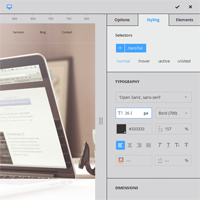Automattic recently won a cybersquatting case against Thesis developer Chris Pearson (Thesis is a WordPress framework). In my opinion, Chris Pearson should have won the case, but before I explain why, allow me to back up a little and explain what this story is all about.
Automattic and Chris Pearson have never had a good relationship. The main reason for this is that Chris Pearson never released Thesis under the GNU General Public License; despite the fact that he was releasing products for WordPress, which is a GPL product (and therefore any products released for it have to be GPL as you need to give other users the same rights you have).
In a famous interview with Andrew Warner five years ago, Matt Mullenweg and Chris Pearson had a heated discussion about the issue. You can view the interview in the video below.
I believe Matt Mullenweg was right about that particular issue. Thesis should have been released under the GPL license.
Chris Pearson later announced via Twitter that Thesis was adopting a split GPL license in which the PHP would not be released as GPL. Matt Mullenweg did not seem too happy with this as GPL was not been fully adopted and pointed to Mark Jaquith’s article about how all WordPress themes are derivatives of WordPress.
Regardless, the whole debate over the issue seemed to be over….or so it seemed. Five years later, Chris Pearson once again finds himself at loggerheads with Automattic.
The Thesis.com Domain Dispute
Chris Pearson released Thesis around 2008. At the bottom of the Thesis website, you will see a note that states:
“DIYthemes, Thesis, and Thesis Theme are registered trademarks of DIYthemes, LLC. Thesis is patent-pending software.”
Despite registering Thesis related trademarks, Chris Pearson never acquired the Thesis.com domain. I was a little surprised at this at first, but if you look at whois records for the domain, you will see that the domain was first registered in the late 90s. I suspect that Chris Pearson never registered the domain in the beginning because it was not available and did not make buying it a priority.

Here’s where the story gets interesting.
Last year, the person who owned the Thesis.com domain started contacting people who they thought would be interested in buying the domain. Chris Pearson apparently made a bid for the domain, however Automattic outbid him and purchased the domain for a whopping $100,000.
Chris Pearson disputed the ownership of the domain by Automattic, however on 3 July 2015 a panel decided that the domain should remain with Automattic.
The official response from the mediation panel lists the main contentions by both parties. I have listed the main contentions below, though you should read the full response to get a complete overview of the case.
Chris Pearson’s Contentions
Below is a copy of the contentions put forward by Chris Pearson’s lawyer:
- Policy 4(a)(i)
- Complainant has rights in the THESIS mark through registration with the United States Patent and Trademark Office (“USPTO”) (Reg. No. 4,039,583, registered October 11, 2011).
- Respondent’s disputed domain name <thesis.com> is identical to Complainant’s THESIS mark except for the inclusion of the generic top-level domain name (“gTLD”) “.com.” which does not distinguish the domain from Complainant’s mark.
- Policy 4(a)(ii)
- Respondent does not have any products named “thesis;” nor does it offer services using the “thesis” name.
- Respondent’s registration of the disputed domain name, which is identical to Complainant’s mark, to sell competing products, likely violates Complainant’s trademark rights.
- Policy 4(a)(iii)
- Respondent purchased the disputed domain name to confuse and redirect customers and potential customers to Respondent’s competing webpage.
Automattic’s Contentions
Below is a copy of the contentions put forward by Automattic:
- The Panel notes that Respondent failed to submit its response within the requisite time period, failing to comply with ICANN Rule #5. In its discretion, the Panel considered Respondent’s arguments in the late filed Response in the interest of justice.
- Policy 4(a)(i)
- Respondent does not contest this point.
- Policy 4(a)(ii)
- Respondent asserts that “Thesis” is a generic term. See Resp., at Attached Ex. A
- Respondent is using the disputed domain name in connection with a blogging site.
i. Respondent maintains that such use serves as an invitation to Internet users to discuss, object, and debate certain topical issues and, therefore, Respondent’s use falls within the definition of the term “thesis” as referenced by Respondent’s Attached Exhibit A.
- Allegedly, Respondent and Complainant were approached by a third-party relative to the purchase of the <thesis.com> domain name, and Respondent was the high bidder, paying $100,000.00 for the domain name.
i. Such purchases have been considered a bona fide offering of goods under Policy 4(c)(i).
- Policy 4(a)(iii)
- Complainant has not sufficiently proven Respondent’s bad faith with supporting evidence.
- While visitors to <thesis.com> are redirected to <themeshaper.com>, such redirection furthers Respondent’s purpose in providing a blogging site.
i. Such use is free of charge, and therefore Policy 4(b)(iv) is not applicable.
ii. The resolving site does not claim to be Complainant or an agent of Complainant, and therefore does not create confusion as to the source, sponsorship, affiliation, or endorsement of the <thesis.com> domain name with Complainant.
- The Panel notes that the disputed domain name was created November 8, 1998. Complainant’s registration of the THESIS mark was dated October 11, 2011.
A Review of the Main Contentions
Legal documents are never the easiest things to follow, so let’s take a closer look at the main points that were raised in the contentions.
Chris Pearson’s contentions:
- Chris Pearson registered Thesis as a trademark with the United States Patent and Trademark Office
- Automattic do not sell any products or services with the name “Thesis”
- Chris Pearson believes that Automattic purchased the disputed domain name to confuse and redirect customers and potential customers to a competing webpage
Automattic’s contentions:
- Automattic asserts that “Thesis” is a generic term
- Automattic redirects Thesis.com to ThemeShaper.com
- Automattic note that ThemeShaper.com is a blogging site
- Automattic was the highest bidder and paid $100,000 for Thesis.com
- Automattic believe that Chris Pearson has not sufficiently proven Automattic’s bad faith with supporting evidence
Some of the above contentions cannot be disputed. For example, that Chris Pearson registered Thesis as a trademark or that Automattic paid $100,000 for the domain. Nor can anyone dispute the fact that WordPress sell any products or services with the name Thesis. Automattic could, of course, do that in the future, but it would be silly for them to do that as Thesis is so well known that it would confuse WordPress users.
Therefore, the main issues of contention that need to be reviewed are whether “Thesis” is a generic term and whether Automattic purchased the domain name in bad faith to confuse and redirect customers to a competing website. We also need to look at whether ThemeShaper is indeed a blogging website.

Without doubt, the word “Thesis” is a generic term. That is not something that I believe anyone can argue. However, the issue of whether “Thesis” is a generic term or not is irrelevant as within WordPress community, everyone knows the word thesis and everyone associates that word with Chris Pearson’s WordPress framework.
Automattic are aware of this. They are aware of the popularity of Thesis and they are aware that the WordPress community associates the word thesis with Chris Pearson’s product. That issue alone suggests that the domain was registered in bad faith.
How would the WordPress community react if I purchased Genesis.com and started a WordPress related website? I could start a theme review blog or theme directory. However, everyone is aware of StudioPress’s Genesis framework and there would be a lot of confusion as to whether Genesis.com was the official home page of StudioPress’s flagship product.
One key issue that seems to have influenced the panel on their decision is the fact that ThemeShaper is a blogging website. ThemeShaper has only published six blog posts this week and the “Learn how to make a theme” and “The _S Starter Theme” blog posts that are linked at the top of every page have not been updated since 2012. So while ThemeShaper is technically run as a blog, it is certainly not an active blog (though I appreciate that is not something a domain panel would look at as a factor in this dispute).
Underneath the main logo ThemeShaper is a short paragraph that explains what the website is all about:
“This is ThemeShaper; a WordPress-powered blog and home to the Automattic Theme Division. We shape beautiful and customizable themes that make the world a better place.”
The key part to note in that paragraph is “home to the Automattic Theme Division”. Is the home of the Automattic theme division simply a blog? It certainly does not sound like one.
In my opinion, there is no doubt that redirecting Thesis.com visitors to the home of the Automattic theme division is confusing to WordPress users.
My Opinion on This Issue
Automattic may have won this domain dispute, but in my opinion they have scored an own goal. They have made themselves look childish, petty, and vindictive. It seems like nothing more than getting one over a person they have previously had disagreements with in the past.
As I’m sure you are aware, Automattic/WordPress aggressively go after anyone who uses WordPress in their domain name. It is therefore very hypocritical of them to accuse others of domain hijacking and then do the same thing themselves.
Matt Mullenweg has always promoted Automattic as an ethical company who does the right thing for the community, though the reality is that Automattic do not share the ideals they expect others to follow.
I have spoken in the past about how Automattic abuse their position for their own gain. Whether it be buying up multiple WordPress news blogs so they can control the news or whether it be promoting those news blogs on millions of websites around the world in WordPress dashboards. Not to mention the fact that the majority of featured WordPress plugins and themes on WordPress.org are developed by Automattic. Many of which push premium versions of the products to users.
However, I believe Automattic have crossed a line this time. In my eyes, it is a black mark against Automattic and an embarrassment for the whole WordPress community.
Automattic may have won this case against Chris Pearson, but the outcome of the dispute does not change what Automattic have actually did. They aggressively outbid a WordPress developer for the domain name of his main product and then redirected it to their theme headquarters. Whether you like Chris Pearson or Matt Mullenweg as people is irrelevant in this. The fact that Automattic did this is disgusting. It really is.
The acquisition of WooCommerce a few months ago means that Automattic are making big moves into the commercial theme world and it would not surprise me if this domain dispute is a sign of things to come. This raises the question as to whether Automattic can ever act impartially when it comes to WordPress.org as they have so many commercial interests that rely on the influence and power they have within the community.
Rhys Wynne summed up my feelings about this whole thing perfectly on Rise Forums when he said that these events have made him “embarrassed being a member of the WordPress community”. As someone who is passionate about the WordPress platform, I feel the same way.
Automattic may have won their domain dispute against Chris Pearson for Thesis.com, but the fact Automattic went out of their way to spend $100,000 to hijack a domain, simply to redirect it to one of their own websites, illustrates that the company has got their priorities all wrong.
Thanks for reading.
Kevin

